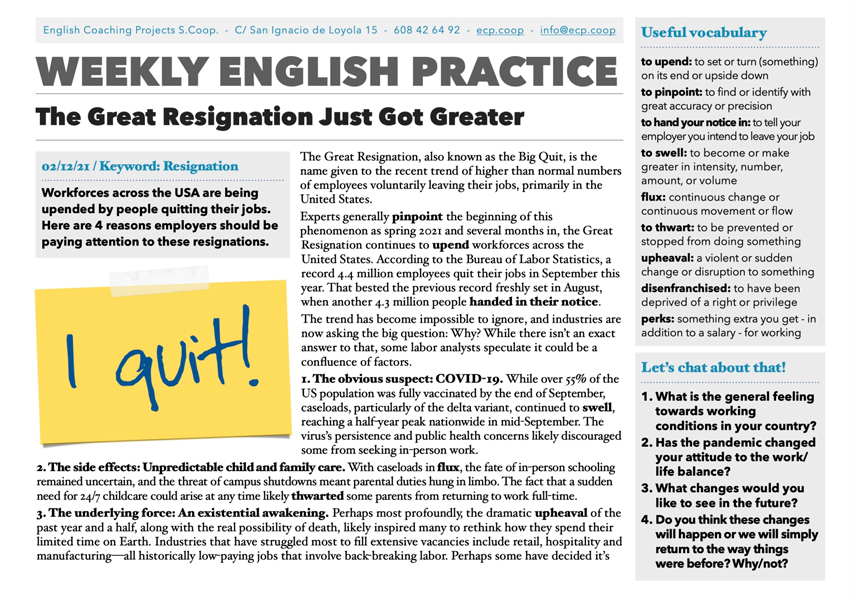The Great Resignation Just Got Greater
02/12/21 / Keyword: Resignation
Workforces across the USA are being upended by people quitting their jobs. Here are 4 reasons employers should be paying attention to these resignations.
Click HERE to download the Weekly English Practice as a PDF.
Useful vocabulary
to upend: to set or turn (something) on its end or upside down
to pinpoint: to find or identify with great accuracy or precision
to hand your notice in: to tell your employer you intend to leave your job
to swell: to become or make greater in intensity, number, amount, or volume
flux: continuous change or continuous movement or flow
to thwart: to be prevented or stopped from doing something
upheaval: a violent or sudden change or disruption to something
disenfranchised: to have been deprived of a right or privilege
perks: something extra you get – in addition to a salary – for working
Listen to the audio and read the text (refresh the page if it’s not visible).
Workforces across the USA are being upended by people quitting their jobs. Here are 4 reasons employers should be paying attention to these resignations.
The Great Resignation, also known as the Big Quit, is the name given to the recent trend of higher than normal numbers of employees voluntarily leaving their jobs, primarily in the United States.
Experts generally pinpoint the beginning of this phenomenon as spring 2021 and several months in, the Great Resignation continues to upend workforces across the United States. According to the Bureau of Labor Statistics, a record 4.4 million employees quit their jobs in September this year. That bested the previous record freshly set in August, when another 4.3 million people handed in their notice.
The trend has become impossible to ignore, and industries are now asking the big question: Why? While there isn’t an exact answer to that, some labor analysts speculate it could be a confluence of factors.
1. The obvious suspect: COVID-19. While over 55% of the US population was fully vaccinated by the end of September, caseloads, particularly of the delta variant, continued to swell, reaching a half-year peak nationwide in mid-September. The virus’s persistence and public health concerns likely discouraged some from seeking in-person work.
2. The side effects: Unpredictable child and family care. With caseloads in flux, the fate of in-person schooling remained uncertain, and the threat of campus shutdowns meant parental duties hung in limbo. The fact that a sudden need for 24/7 childcare could arise at any time likely thwarted some parents from returning to work full-time.
3. The underlying force: An existential awakening. Perhaps most profoundly, the dramatic upheaval of the past year and a half, along with the real possibility of death, likely inspired many to rethink how they spend their limited time on Earth. Industries that have struggled most to fill extensive vacancies include retail, hospitality and manufacturing—all historically low-paying jobs that involve back-breaking labor. Perhaps some have decided it’s simply not worth it. News reports suggest some are hoping to switch careers, while others, such as older workers, are opting for early retirement.
4. The ultimate result: Newly empowered workers. With the masses behind it, the Great Resignation promises a sort of labor revolution for a formerly disenfranchised workforce. With many big-name companies starved for staff, some have begun to offer employee perks ranging from wage bonuses, to free tuition, to student loan relief, to complimentary daycare. And some job seekers are realising they now have the power to choose—or to use the worker shortage as an opportunity to demand better conditions, as shown by an increase in worker strikes at companies.
Adapted from this article from Fast Company magazine by ECP coach Darren Lynch
Let’s chat about the Great Resignation!
- What is the general feeling towards working conditions in your country?
- Has the pandemic changed your attitude to the work/life balance?
- What changes would you like to see in the future?
- Do you think these changes will happen or we will simply return to the way things were before? Why/not?
Take a moment to look at these related articles!
How to Quit Your Job and Leave a Good Impression

